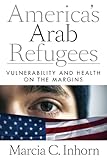America's Arab refugees : vulnerability and health on the margins / Marcia C. Inhorn.
Material type: TextPublisher: Stanford, California : Stanford University Press, [2018]Copyright date: ©2018Description: 1 online resource (xix, 232 pages)Content type:
TextPublisher: Stanford, California : Stanford University Press, [2018]Copyright date: ©2018Description: 1 online resource (xix, 232 pages)Content type: - text
- computer
- online resource
- 9781503604384
- 1503604381
- Refugees, Arab -- Medical care -- Michigan -- Detroit
- Refugees, Arab -- Health and hygiene -- Michigan -- Detroit
- Refugees, Arab -- Michigan -- Detroit -- Social conditions
- Medical care
- Arabs
- Delivery of Health Care
- Health Status
- Refugees
- Michigan
- Réfugiés arabes -- Soins médicaux -- Michigan -- Detroit
- Réfugiés arabes -- Santé et hygiène -- Michigan -- Detroit
- Réfugiés arabes -- Michigan -- Detroit -- Conditions sociales
- Arabes
- Prestation de soins
- POLITICAL SCIENCE -- Public Policy -- Social Security
- POLITICAL SCIENCE -- Public Policy -- Social Services & Welfare
- Refugees, Arab -- Health and hygiene
- Refugees, Arab -- Medical care
- Refugees, Arab -- Social conditions
- Michigan -- Detroit
- 362.108992/753077434 23
- RA448.5.A73
- WA 300 AM5
| Item type | Home library | Collection | Call number | Materials specified | Status | Date due | Barcode | |
|---|---|---|---|---|---|---|---|---|
 Electronic-Books
Electronic-Books
|
OPJGU Sonepat- Campus | E-Books EBSCO | Available |
Includes bibliographical references and index.
Timelines : the war in Lebanon and the war in Iraq -- Preface -- Prologue : Fatima and Sadiq : from Iraq to Michigan -- Introduction : when Arabs fled : a legacy of conflict -- Why they fled : war and the health costs of conflict -- Where they resettled : poverty on the margins of Detroit -- How they struggle : health disparities and unequal treatment -- What they feel : reproductive exile between moral worlds -- Conclusion : Arab lives matter : why America must care.
Print version record and CIP data provided by publisher; resource not viewed.
"America's Arab Refugees is a timely examination of the world's worst refugee crisis since World War II. Tracing the history of Middle Eastern wars - especially the U.S. military interventions in Iraq and Afghanistan - to the current refugee crisis, Marcia C. Inhorn examines how refugees fare once resettled in America. In the U.S., Arabs are challenged by discrimination, poverty, and various forms of vulnerability. Inhorn shines a spotlight on the plight of resettled Arab refugees in the ethnic enclave community of "Arab Detroit," Michigan. Sharing in the poverty of Detroit's Black communities, Arab refugees struggle to find employment and to rebuild their lives. Iraqi and Lebanese refugees who have fled from war zones also face several serious health challenges. Uncovering the depths of these challenges, Inhorn's ethnography follows refugees in Detroit suffering reproductive health problems requiring in vitro fertilization (IVF). Without money to afford costly IVF services, Arab refugee couples are caught in a state of "reproductive exile"--Unable to return to war-torn countries with shattered healthcare systems, but unable to access affordable IVF services in America. America's Arab Refugees questions America's responsibility for, and commitment to, Arab refugees, mounting a powerful call to end the violence in the Middle East, assist war orphans and uprooted families, take better care of Arab refugees in this country, and provide them with equitable and affordable healthcare services."--Amazon.com.
eBooks on EBSCOhost EBSCO eBook Subscription Academic Collection - Worldwide
There are no comments on this title.

